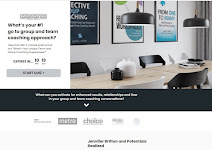
Having a robust toolkit of activities in your back pocket is a must have for team and group coaches. Building onto other posts here at the Group Coaching Ins and Outs blog (
Four Ways to Create Coaching Closure with Groups etc), today's post covers four of my favorite activities for opening group and team coaching sessions.
Trust and connection is key to successful coaching conversations, and in a group setting, it is likely that people will not know each other. In a team setting, history, roles and power differentials can also impact trust and connection.
These four activities can be adapted for the different groups and teams you work with:
1. Personal Logos: I've used this activity with multiple groups and teams. With teams it is always really interesting to see what themes emerge from the logos people choose. Instructions are simple, ask people to create a logo which represents what they bring to the group or team. Have them write it down as part of their name card. Get each person to introduce themselves according to their logo. Have the group or team notice the patterns, similarities etc.
2. Visual Cards -
Visual cards can provide a new "spark" for conversation. Lay photographs (your own or a photo deck like
Conversation Sparker Cards) out on a table and have people select the card that either:
1. Represents that they bring to the group;
2. Represents their hope for the work together;
3. Signifies where they see the team right now (for teams)
If you have time, you may want to ask people to select a second photo which represents:
1. What they hope to gain or achieve through your work together
2 Where they would like to see the team going (for teams)
Check out one of the blabs I did last fall, dedicated to working with visual cards. As I mentioned in my July Team and Group Coaching Newsletter (
subscribe here), one of my biggest sellers at last month's ICF Mid-West Conference was the 40 Ways To Work With Visual Cards E-manual.
Check it out here.
3. Patrick Lencioni's Personal Histories
- Many coaches and trainers love the resources included the Patrick Lencioni's Five Dysfunctions of Team Playbook. One you will want to look up and consider using is his Personal Histories exercise. I have used it with executive teams from mining, full teams involved in television, and also with teams in customer service. When time has been available, it's been a valuable exercise in building connection at the start of one day and longer sessions.
4. And the generic go-round - Who are you, what's brought you here. For virtual shorter calls giving people an opportunity to connect and hear each other's voices can be important and can help with boosting engagement and ownership of the call. When people come to a virtual call and realize that something is a little different with their introductions, it may be easier to cut through the assumption that your program is goingt to be another experience of "Death by Conference Call"
People remember the start and end of things and a memorable kick off can be very important.Taking time to focus on creating the space for trust and connection helps people feel safe to take the conversation to a deeper level, and really bring themselves into the conversation.
What's going to help you feel confident around that? What are your next steps around this?
Have a great week,
Jennifer
Jennifer
Britton, MES, CPT, PCC
About Us: Jennifer Britton is
author
of Effective Group Coaching (Wiley, 2010)
andFrom
One to Many: Best Practices for Team and Group Coaching (Jossey-Bass,
2013) . Since 2004 she and her company, Potentials Realized, have
supported thousands of coaches, trainers, and leaders, design and create more
impactful team and group programs (in-person and virtual). Jennifer offers
customized programs for organizations, as well as virtual public training
programs. Our areas of specialty are team development, leadership and coaching.
Our 2017 programming starts during the week of January 9th and will
include: The
Group
Coaching Essentials teleseminar (8.75 CCEs),
The
Advanced Group and Team Coaching Practicum (10 CCEs), and the
Mentor
Coaching Group for ACC/PCC portfolio routes. Our 2017
Learning Lab and Design
Studio Group for Coaches who want to build their business and expand their
group and team programs starts January as well (2 group calls on Fridays
throughout 2017)










